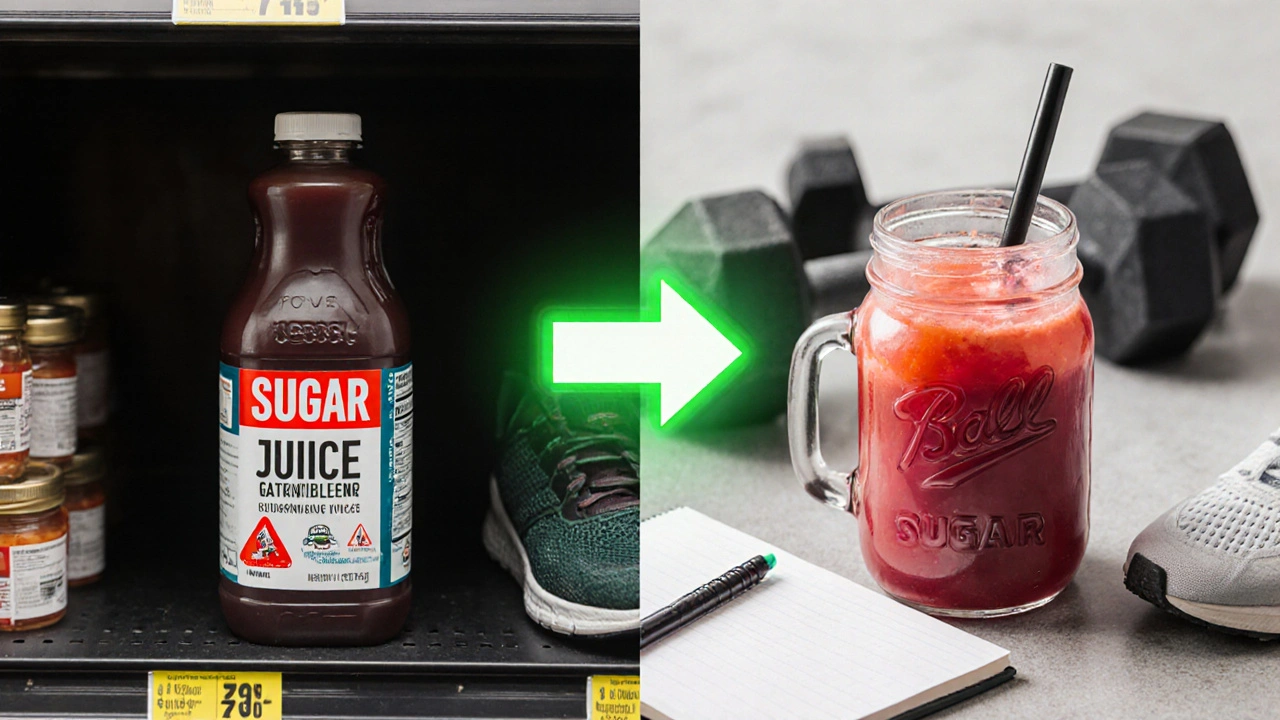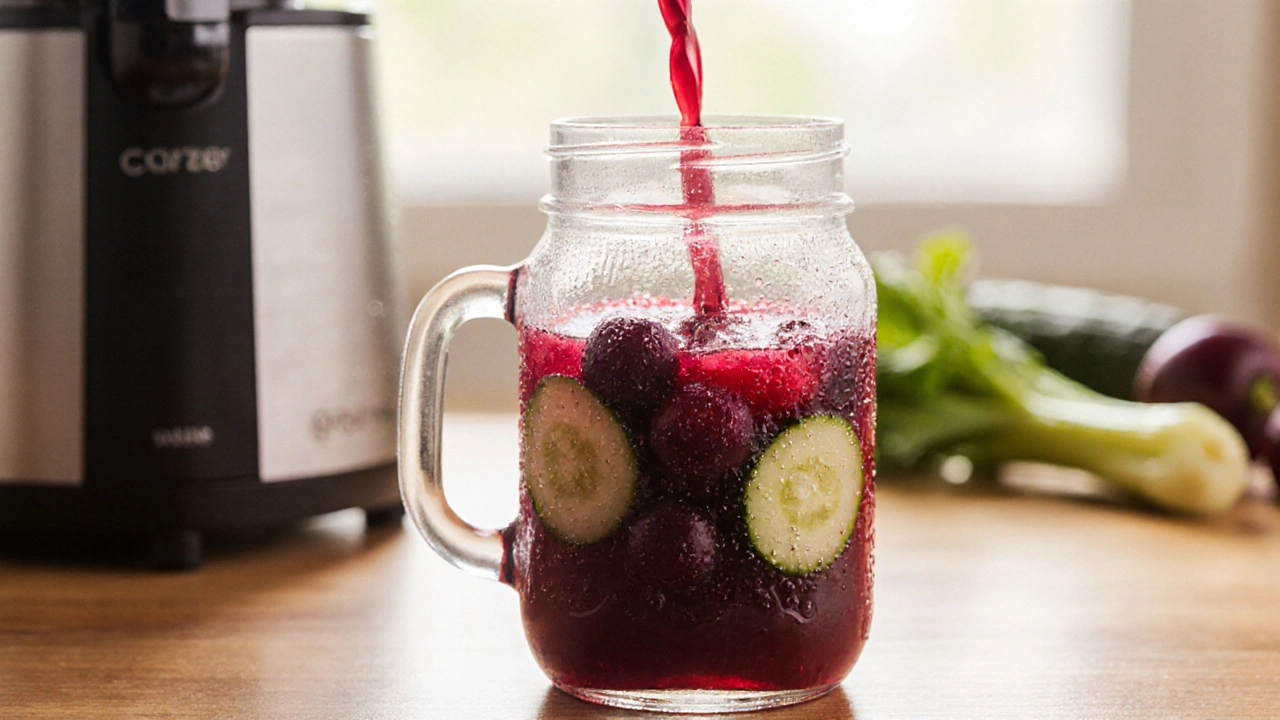Performance Juice Calculator
Find Your Perfect Performance Juice
Get personalized recommendations based on your workout type and timing
Ever finish a tough workout and feel like your body just hit a wall-even though you drank water and ate a banana? You might be missing something simple but powerful: health juice. Not the sugary, pasteurized stuff in plastic bottles. Real, freshly made juice packed with vitamins, minerals, and plant compounds that actually help your body recover, rebuild, and perform better.
Let’s be clear: juice isn’t a magic potion. But when you choose the right ingredients and drink it at the right time, it becomes a quiet superpower for anyone who moves their body regularly-whether you’re a weekend hiker, a runner training for a 5K, or someone lifting weights in the basement gym.
Why Your Muscles Need More Than Water
Water keeps you hydrated. That’s essential. But hydration alone doesn’t fix muscle damage or refill energy stores. After exercise, your body needs specific nutrients to repair muscle fibers, reduce inflammation, and restore electrolytes. That’s where health juice steps in.
A 2023 study from the Journal of the International Society of Sports Nutrition found that athletes who consumed beetroot and tart cherry juice daily for two weeks saw a 12% improvement in time-to-exhaustion during high-intensity cycling tests. Why? Beetroot is rich in nitrates, which help your blood vessels widen and deliver oxygen more efficiently. Tart cherry juice? It’s loaded with anthocyanins-natural compounds that cut inflammation and muscle soreness.
Most people think protein shakes are the only way to recover. But whole-food nutrients in juice work faster and with fewer additives. They don’t just replace what’s lost-they help your body work smarter.
The Top 5 Juices That Actually Boost Performance
Not all juices are created equal. Here are five that science and athletes back up:
- Beetroot juice: High in dietary nitrates → boosts nitric oxide → improves blood flow and endurance. Drink 250ml about 2 hours before exercise.
- Tart cherry juice: Contains antioxidants that reduce muscle damage. Best taken after workouts or before bed to speed recovery.
- Pomegranate juice: Rich in punicalagins, which lower oxidative stress. One study showed runners who drank it daily had less muscle soreness after a marathon.
- Cucumber and celery juice: Hydrating, low-sugar, and full of potassium and magnesium. Perfect for post-workout rehydration without spiking blood sugar.
- Spinach and green apple juice: Spinach gives you iron and folate; green apple adds natural sweetness and vitamin C. Helps with oxygen transport and immune support during heavy training.
These aren’t just trendy smoothie bowl toppings. They’re targeted tools. Think of them like supplements-but without the pills, fillers, or artificial flavors.
Timing Matters: When to Drink for Maximum Impact
Drinking juice at the wrong time can make it useless-or even counterproductive.
Before exercise: Stick to low-fiber, easily digestible juices like beetroot or pomegranate. Fiber slows absorption, and you don’t want bloating mid-run. Aim for 150-250ml about 90 minutes before you start.
During exercise: Skip juice unless you’re doing a long endurance event (over 90 minutes). Then, small sips of diluted beetroot or coconut water can help maintain electrolyte balance.
After exercise: This is the golden window. Within 30-60 minutes, your muscles are hungry for nutrients. A 200ml glass of tart cherry juice mixed with a splash of ginger (for anti-inflammatory boost) can reduce soreness by up to 25%, according to research from the University of Vermont.
And yes-you can drink it at night. Tart cherry juice naturally contains melatonin, the sleep hormone. Better sleep = better recovery = stronger performance the next day.

What to Avoid in Health Juice
Not every juice labeled “healthy” actually is.
Watch out for:
- Added sugars: Even “natural” fruit concentrates can spike insulin and cause energy crashes. Stick to whole fruits and vegetables-no syrups.
- High-glycemic fruits: Pineapple, mango, and grapes in large amounts can cause blood sugar spikes. Balance them with low-sugar veggies like kale, cucumber, or celery.
- Store-bought pasteurized juices: Heat treatment kills enzymes and destroys antioxidants. If it’s not cold-pressed and refrigerated, it’s probably not helping your performance.
- Detox juices: Those 3-day cleanses with only lemon and cayenne? They don’t improve performance. They deplete your energy and electrolytes.
The goal isn’t to “cleanse.” It’s to fuel. Think of juice as a nutrient delivery system, not a diet.
How to Make Your Own Performance Juice (Simple Recipe)
You don’t need a $500 juicer. A blender and a nut milk bag work fine.
Try this post-workout blend:
- 1 cup tart cherries (frozen or fresh)
- 1 small beetroot, peeled
- 1/2 cucumber
- 1 stalk celery
- 1-inch piece of fresh ginger
- 1/2 green apple (for sweetness)
- 1/2 cup water or coconut water
Blend until smooth. Strain through a nut milk bag or fine sieve if you want it pulp-free. Drink within 20 minutes for maximum nutrient retention. Store leftovers in a sealed jar in the fridge for up to 24 hours.
That’s it. No fancy powders. No protein isolates. Just real food doing real work.

Who Should Skip Health Juice?
Most people benefit. But there are exceptions.
- People with diabetes: Monitor blood sugar. Start with small amounts and pair with protein or fat (like a handful of nuts) to slow absorption.
- Those on blood thinners: Beet greens and spinach are high in vitamin K, which can interfere with medications like warfarin. Talk to your doctor before making it a daily habit.
- Anyone with kidney disease: High-potassium juices (like beetroot or spinach) can be risky. Always check with your nephrologist.
If you’re healthy and active, though? There’s little downside. Just focus on quality, timing, and balance.
The Real Benefit: Consistency Over Quick Fixes
One glass of juice won’t turn you into an elite athlete. But drink it consistently-after every workout, every other day, or even just on training days-and you’ll notice changes.
People who stick with it for 4-6 weeks report:
- Faster recovery between sessions
- Less muscle stiffness the next morning
- More energy during afternoon workouts
- Fewer colds during heavy training blocks
It’s not glamorous. But that’s the point. Real performance gains come from small, smart habits-not expensive gear or flashy supplements.
Health juice is one of those habits. Simple. Affordable. Effective. And it’s been used by athletes for decades-long before the wellness industry turned it into a trend.

